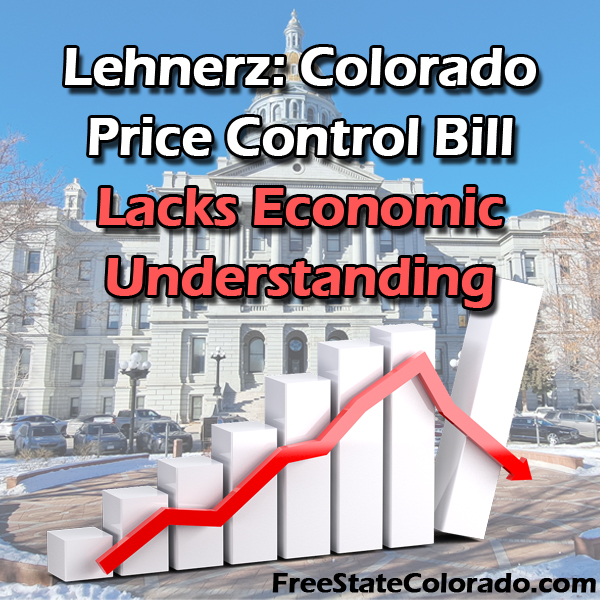Guest post by Frank Lehnerz
If the government tries to wage war against the laws of the market by price control, it undermines the working of the market mechanism and leads to conditions which, from the point of view of the government itself, are less desirable than the previous state of affairs it intended to alter.”
— Ludwig Von Mises, Human Action (1949)
History has repeatedly shown that price controls—whether on food, housing, or other essentials—create virtually no benefits for consumers and only price distortions. By capping what producers or retailers can charge, these controls reduce supply, reduce product or service quality, discourage investment for new, improved, or cheaper products and services, and create market signal distortions.
Of course, these facts haven’t stopped some of Colorado’s lawmakers from ignoring the basics of economics and running a business to draft a bill that will do just these things. House Bill 25‑1010 “Prohibiting Price Gouging in Sales of Necessities” is just that bill, and it’s sparking a growing concern over both its economic merits and the transparency (or lack thereof) behind it.
One of the bill’s cheerleaders, Chad Clifford, State Representative for HD 37, claims grocery stores, which appear to be the primary target of this bill even though they aren’t specifically mentioned in the text, are making “astronomically record profits.” Yet when pressed repeatedly for the data to back up these allegations, Clifford refuses to disclose any specifics.
Instead, he demanded we the people, provide these data to the committee hearing on the bill writing on X:
Clifford’s refusal to answer Coloradans raises two serious issues: a disturbing lack of transparency and an equally worrisome misunderstanding of the economics of retail businesses from one of the very people tasked with creating laws.
First, there is the transparency problem which Clifford has shown an issue with in his supporting of latest gun ban bill as well he and his colleagues are selling as a “high capacity magazine bill.” In a public tweet over the topic of House Bill 25‑1010 however, the sponsor stated after multiple people asked him for data to support his claim grocery stores were engaging in price gouging.
Despite multiple follow‐up requests for him to present Clifford’s supposed data, it remains undisclosed. As a public servant who made an oath to serve the people of this state, Rep. Clifford is obligated to substantiate the claims he uses to justify a new regulatory measure that could have far‐reaching impacts on Colorado businesses and consumers alike. He should know this as both a self-identified business owner himself and a fellow Coloradan. If there truly is compelling evidence of price gouging, releasing it would only strengthen the case for new legislation—so why the continued silence? Robert Reich retweets conflating gross profits with profit margins don’t count either as “data.”
Second, from an economics standpoint, quoting “record profits” solely in billions of dollars is not proof of gouging and shows a profound misunderstanding of concepts taught in any entry-level business and finance course. Large national chains which encompass the majority of grocery sales in Colorado handle immense revenues: a modest net margin – one to three percent – on average in the grocery industry—can still produce very large absolute dollar amounts when measured in gross profits. Yet that does not mean those profits are “astronomical.” If these retailers really were exploiting customers, we would see a dramatic spike in their net profit margins over and above historical or industry norms.
Public filings from major grocers indicate margins remain tight as can be seen by looking at their quarterly or annual financial statements available on virtually any financial news or stock trading platform. That is the data some people provided to Rep. Clifford which he seemingly did not read or he flat-out ignored. Broader economic factors—fuel costs, labor wages, commodity prices—drive up operational expenses. When grocers pass along those higher costs, their top line (sales) may rise, but it does not necessarily mean they’re reaping outsized profits.
Then there’s inflation. Thanks to bipartisan expansion of the money supply has driven up their costs for labor, transportation, and raw materials— as more money chases fewer goods meaning higher retail prices can be a direct pass‐through of those cost increases. “Record” or “astronomical” profits in a multi‐billion‐dollar operation in part stem from inflation and increased revenue volume rather than pure margin expansion.
But wait, things get worse. Over the weekend, I attended a town hall in Fort Collins hosted by a handful of Front Range lawmakers. One of the people in attendance was Yara Zokaie of House District 52 and the supposed author of this bill. Representative Zokaie’s district covers much of the City of Fort Collins, a city that imposes a local food tax on residents. When the topic of her bill was mentioned, I raised my hand and asked her point-blank if she had any data to back this bill and more specifically if she was aware of the low digit profit margins typical among the grocery industry. She quipped back and stated that grocery stores made “billions in profits.” When I told her these are two different metrics, she seemed unmoved and doubled down on her accusation. Here again we have someone (a tax attorney and former Deputy Tax Assessor for Larimer County no less) ignorant of not just basic tenets of economics and business operation, but to add insult to injury, she is the primary author of the bill.
House Bill 25‑1010 aims to cap or regulate grocery prices if they increase over a certain percentage in a certain time period ostensibly to prevent gouging. However since premise of this bill including claims “astronomical” profits is unsubstantiated, the policy will up punishing normal market responses. Price controls risk reducing product variety, driving grocers to stop stocking certain goods, or pushing costs back onto farmers and suppliers in unintended ways. In short, House Bill 25‑1010 could create more problems than it solves if enacted on the basis of unverified claims and its economically illiterate bases.
Proposing price controls period, let alone without solid data-driven justification shows a lack of genuine commitment to serving Coloradans’ best interests. Lawmakers supporting the bill should present evidence of egregious profiteering, demonstrate a comprehensive understanding of factors influencing grocery prices, and propose realistic policies. Instead, Clifford resorts to rhetoric about “astronomical profits” and withhold data, undermining his credibility and trustworthiness. Zokaie’s ignorance is without words. She also mentioned in that same Town Hall she wants to look for any way to dismantle TABOR.
Coloradans deserve solid evidence before we enact sweeping regulations that could disrupt local grocery markets and risk unintended economic harm. It is neither good governance nor sound policy to legislate on assertions that remain unproven. Without transparency and an accurate understanding of grocery store margins, House Bill 25‑1010 stands on shaky ground—falling short of both economic reality and the accountability the people of Colorado should expect.

Frank Lehnerz is a Fort Collins-based engineer who works in the electric energy industry, and he is interested in promoting the message of Liberty.






Recent Comments